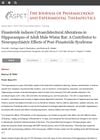61 citations,
April 2018 in “Frontiers in endocrinology” Sex steroids produced in the hippocampus are crucial for brain functions like memory and learning in rodents.
19 citations,
November 2015 in “Radiation Oncology” Hippocampus sparing whole brain radiation therapy prevents hair loss and preserves cognitive function.
 14 citations,
March 2017 in “Brain research”
14 citations,
March 2017 in “Brain research” Progesterone and its byproducts control a specific receptor in the brain independently of progesterone receptors, affecting conditions related to the menstrual cycle.
[object Object] 
Finasteride may cause memory problems by damaging the hippocampus.
33 citations,
December 2017 in “Journal of neuroendocrinology” Sex and stress steroids quickly change brain cell structures in the hippocampus.
 26 citations,
September 2012 in “Epilepsy & Behavior”
26 citations,
September 2012 in “Epilepsy & Behavior” Finasteride worsens seizures in epilepsy rats and speeds up epileptogenesis in mice.
 March 2024 in “Journal of Endocrinological Investigation”
March 2024 in “Journal of Endocrinological Investigation” Finasteride treatment in rats changed the expression of genes related to psychiatric and neurological functions, and these changes persisted after stopping the drug.
April 2015 in “Faculty Opinions – Post-Publication Peer Review of the Biomedical Literature”  13 citations,
January 2020 in “Neuroscience”
13 citations,
January 2020 in “Neuroscience” Blocking 5α-reductase can harm memory and brain structure, and increase harmful brain changes in male mice used for Alzheimer's disease research.
 36 citations,
January 2018 in “Scientific reports”
36 citations,
January 2018 in “Scientific reports” Eating glucoraphanin can help prevent psychosis in offspring whose mothers had immune system activation.
 22 citations,
December 2010 in “Journal of Cosmetic Dermatology”
22 citations,
December 2010 in “Journal of Cosmetic Dermatology” Finasteride may increase depression by reducing brain cell growth.
12 citations,
February 2017 in “International journal of developmental neuroscience” Female guinea pigs exposed to less allopregnanolone before birth showed more anxiety-like behavior.
11 citations,
November 2021 in “International journal of molecular sciences” Gut microbes significantly affect brain steroid levels.
 10 citations,
September 2014 in “The Journal of Steroid Biochemistry and Molecular Biology”
10 citations,
September 2014 in “The Journal of Steroid Biochemistry and Molecular Biology” Allopregnanolone increases KCC2 expression in baby male rats' brains, while finasteride doesn't affect it.
9 citations,
January 2022 in “Biology” Male mice are more susceptible to autism-like changes from valproic acid than female mice.
5 citations,
February 2019 in “Neuroscience letters” Hormones during puberty increase certain receptors in the brain, and this change is influenced by estrogen levels.
 1 citations,
May 2022 in “Research Square (Research Square)”
1 citations,
May 2022 in “Research Square (Research Square)” Acetate helps reduce depression in rats with PCOS by lowering specific gene expression and DNA changes in the brain.
[object Object]  November 2023 in “Research Square (Research Square)”
November 2023 in “Research Square (Research Square)” Finasteride affects the male rat brain by reducing certain protein activation, but these effects may reverse after stopping the drug.
25 citations,
June 2017 in “Neuropharmacology” Increasing TSPO in the brain reduces anxiety and depression.
11 citations,
April 2018 in “Epilepsy research” Letrozole reduces seizures but not brain damage in mice.
 August 2020 in “Current psychopharmacology”
August 2020 in “Current psychopharmacology” Pregnancy and nursing increase certain brain activities in rats, but these changes disappear when the babies are taken away.
Hair follicles supply a crucial brain development protein to the brain via platelets.
 32 citations,
May 2010 in “Pharmacopsychiatry”
32 citations,
May 2010 in “Pharmacopsychiatry” Finasteride reduces new brain cells in male mice, possibly causing depression.
 12 citations,
August 2018 in “Psychiatry research”
12 citations,
August 2018 in “Psychiatry research” Estazolam reduces anxiety-like behavior in PTSD by increasing allopregnanolone levels.
 81 citations,
July 2012 in “Translational Psychiatry”
81 citations,
July 2012 in “Translational Psychiatry” Memantine may slightly improve memory in people with Down syndrome, but more research is needed.
 65 citations,
October 2008 in “Journal of Neuroendocrinology”
65 citations,
October 2008 in “Journal of Neuroendocrinology”  27 citations,
July 2008 in “Neuroscience”
27 citations,
July 2008 in “Neuroscience” Finasteride given to baby rats causes anxiety-like behavior and worsens learning from punishment in adult rats.
 254 citations,
January 2012 in “Nature Reviews Molecular Cell Biology”
254 citations,
January 2012 in “Nature Reviews Molecular Cell Biology” Stem cell offspring help control their parent stem cells, affecting tissue health, healing, and cancer.
 37 citations,
September 2018 in “Psychoneuroendocrinology”
37 citations,
September 2018 in “Psychoneuroendocrinology” Finasteride treatment in male rats causes long-lasting effects on depression-like behavior, brain cell growth, inflammation, and gut bacteria composition.
 22 citations,
October 2019 in “Cerebral cortex”
22 citations,
October 2019 in “Cerebral cortex” Sex neurosteroids cause different effects on hippocampal synaptic plasticity in males and females.


















